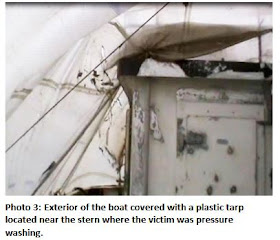A Boat Maintenance Crew Supervisor Dies of Carbon Monoxide Poisoning While Using a Gasoline-Powered Pressure Washer
SUMMARY
On May 17, 2012, a 25-year-old boat maintenance crew supervisor died from carbon monoxide poisoning while using a gasoline-powered pressure washer to strip paint from a boat.
On the day of the incident, he was supervising a crew using a pressure washer and disc grinders to remove old paint from the exterior of a 162-foot steel hulled fishing boat moored at a dock. The six crew members were working on the boat in different areas that were covered with plastic tarps in order to prevent paint chips and dust from entering the water.
At the start of the day, the gasoline-powered pressure washer was positioned on the dock. Later, employees of another contractor moved the pressure washer onto the boat to clear the way for supply deliveries. Shortly before the end of the work day, the victim moved the pressure washer onto a side deck passageway that was fully enclosed by plastic tarps. Working alone, he used the pressure washer for about 20 minutes. A co-worker went to look for the victim and found him unconscious on top of the pressure washer. Emergency responders arrived and determined that the victim was deceased. The medical examiner reported the cause of death as “carbon monoxide intoxication due to inhalation of engine exhaust.”
RECOMMENDATIONS
Washington State Fatality Assessment and Control Evaluation (FACE) investigators concluded that to protect employees from the hazard of carbon monoxide (CO) poisoning from small gasoline-powered engines and tools, employers should:
- Ensure that gasoline-powered pressure washers or other fuel-powered tools arenot used in enclosed or partially enclosed areas where CO can build up.
- Train employees on the hazards, sources, symptoms, and control of COexposure from fuel-powered equipment and tools.
- Ensure that personal CO detectors equipped with audible alarms are used byemployees when working with small gasoline-powered engines in locations where CO may build up.
- Coordinate work activities at job sites where there are multiple contractors andtheir employees to ensure safe work.
- Ensure that CO safety warning labels are attached to pressure washers and thatthey are replaced when no longer readable.
- Consider using alternatives to fuel powered equipment and tools.




